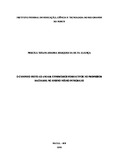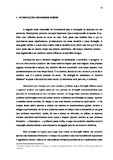| dc.creator | Aliança, Priscila Tiziana Seabra Marques da Silva | |
| dc.date.accessioned | 2017-02-17T12:50:00Z | |
| dc.date.available | 2017-02-13 | |
| dc.date.available | 2017-02-17T12:50:00Z | |
| dc.date.issued | 2016-04-25 | |
| dc.identifier.uri | http://memoria.ifrn.edu.br/handle/1044/922 | |
| dc.description.abstract | ABSTRACT
This dissertation aims to discuss the formative itinerary of teachers who have not been through proper institutional teaching education and teach “Ensino Médio Integrado”, which is a teaching offer that articulates high school education and vocational training. The research took plave within the Mechatronics course at the Federal Institute of Education, Science and Technology of Rio Grande do Norte – Parnamirim. This investigation relies on the theoretical basis of the (auto)biographical approach as to support the construction of the data. The analysis material was built from the formative narratives of five teachers who have a bachelor’s degree (not a “licenciatura” degree, which is the specific degree for future teachers). The notion of EMI is based on the works of Marx (2011; 1965), Gramsci (2010), Moura (2008; 2010), Saviani (2003) and Frigotto, Ciavatta and Ramos (2005). The core document of the Technical Vocational High-School level Education Integrated to High School (BRASIL, 2007) presents the fundamental categories of EMI: (1) wholesome humane education; (2) work, science, technology and culture as integral parts of humane education; (3) work as an educational principle; (4) research as an educational principle; (5) relationship between the parts and the whole perspective. EMI is also based on polytechnic education and a unitary schooling that could surpass the structural dichotomy. The (auto)biographical approach is based, according to Passeggi (2011, p. 20-21), on three principles: (1) the “construction of reality through language by the individual of the group”; (2) language as a “mediator element of the subject’s historicity, through practical hermeneutics”; (3) research as a “political and epistemological stand”. This research relies on the studies of self-narratives (PASSEGGI, 2010; 2011; 2012; 2014; JOSSO, 2004; 2010) and memory and narrative (SARLO, 2007; BOSI, 2003; 2004), as well as philosophers that articulate action and experience (LARROSA, 2006) and action and narrative (RICOEUR, 1994). The analysis of the formative narratives indicates that those teachers count on, primarily, their own memory of their school years and grad school years to establish their first pedagogical practices. Secondly, they rely on support from their colleagues and daily experience. The results also show a disconnection between the self-formative processes of the teachers and the foundations of EMI, indicating that a systematized ambience of education is necessary. | pt_BR |
| dc.language | por | pt_BR |
| dc.publisher | Instituto Federal de Educação, Ciência e Tecnologia do Rio Grande do Norte | pt_BR |
| dc.rights | Acesso Aberto | pt_BR |
| dc.subject | Educação Profissional | pt_BR |
| dc.subject | Ensino médio integrado | pt_BR |
| dc.subject | Formação docente | pt_BR |
| dc.title | O caminho feito ao andar: itinerários formativos do professor bacharel no ensino médio integrado | pt_BR |
| dc.type | Dissertação | pt_BR |
| dc.creator.Lattes | http://lattes.cnpq.br/9472832855660995 | pt_BR |
| dc.contributor.advisor1 | Souza, Francisco das Chagas Silva | |
| dc.contributor.advisor1Lattes | http://lattes.cnpq.br/7340894360051987 | pt_BR |
| dc.contributor.referee1 | Souza, Francisco das Chagas Silva | |
| dc.contributor.referee1Lattes | http://lattes.cnpq.br/7340894360051987 | pt_BR |
| dc.contributor.referee2 | Passeggi, Maria da Conceição Ferrer Botelho Sgadari | |
| dc.contributor.referee2Lattes | http://lattes.cnpq.br/5015707256397317 | pt_BR |
| dc.contributor.referee3 | Henrique, Ana Lúcia Sarmento | |
| dc.contributor.referee3Lattes | http://lattes.cnpq.br/0475297305451211 | pt_BR |
| dc.contributor.referee4 | Câmara, Sandra Cristinne Xavier da | |
| dc.contributor.referee4Lattes | http://lattes.cnpq.br/4591217164987633 | pt_BR |
| dc.contributor.referee5 | Neta, Olívia Morais de Medeiros | |
| dc.contributor.referee5Lattes | http://lattes.cnpq.br/7542482401254815 | pt_BR |
| dc.publisher.country | Brasil | pt_BR |
| dc.publisher.department | Natal - Central | pt_BR |
| dc.publisher.program | Mestrado Acadêmico em Educação Profissional | pt_BR |
| dc.publisher.program | Mestrado Acadêmico em Educação Profissional | pt_BR |
| dc.publisher.initials | IFRN | pt_BR |
| dc.subject.cnpq | CNPQ::CIENCIAS HUMANAS | pt_BR |
| dc.description.resumo | RESUMO
O objetivo deste trabalho é discutir o itinerário formativo do professor das chamadas “disciplinas técnicas” do Ensino Médio Integrado à Educação Profissional (EMI), mais especificamente os professores bacharéis atuantes no EMI de Mecatrônica no campus Parnamirim do Instituto Federal de Educação, Ciência e Tecnologia do Rio Grande do Norte. Para investigar essa trajetória de formação, discuto as bases teóricas da abordagem (auto)biográfica, de modo a fundamentar a construção e a análise dos dados utilizados no trabalho. Os dados foram constituídos a partir das narrativas de formação de cinco professores bacharéis. As concepções referentes ao EMI encontram, neste estudo, embasamento teórico e político em Marx (2011; 1965), Gramsci (2010), Moura (2008; 2010), Saviani (2003) e Frigotto, Ciavatta e Ramos (2005). O Documento Base da “Educação Profissional Técnica de Nível Médio Integrada ao Ensino Médio” (BRASIL, 2007), no capítulo Concepções e Princípios, apresenta as categorias sobre as quais se ergue o EMI: (1) formação humana integral; (2) trabalho, ciência, tecnologia e cultura como categorias indissociáveis da formação humana; (3) trabalho como princípio educativo; (4) pesquisa como princípio educativo; (5) relação parte-totalidade na proposta curricular. Além destes elementos, o EMI pressupõe a busca por uma formação baseada na politecnia e numa escola unitária que supere a dualidade estrutural historicamente estabelecida. A abordagem (auto)biográfica está, segundo Passeggi (2011, p. 20-21), ancorada em três princípios: (1) a “construção da realidade mediante a linguagem pelo sujeito ou pelo grupo”; (2) a linguagem como “elemento mediador da historicidade do sujeito, mediante uma hermenêutica prática”; (3) a pesquisa como um “posicionamento epistemo-político”. Esta pesquisa se baseia nos estudos de pesquisadoras da narrativa de si (PASSEGGI, 2010; 2011; 2012; 2014; JOSSO, 2004; 2010) e memória e narrativa (SARLO, 2007; BOSI, 2003; 2004), assim como filósofos que articulam ação e experiência (LARROSA, 2006) e ação e narrativa (RICOEUR, 1994).A análise das narrativas indica que os professores se apoiam primordialmente na própria memória dos tempos de escola e graduação para estabelecerem suas primeiras práticas pedagógicas; em segundo lugar, no apoio de colegas e a própria experiência cotidiana. O estudo também aponta desencontros entre os processos de autoformação do professor bacharel e o os pressupostos do EMI, indicando que um espaço sistematizado de heteroformação se faz necessário. | pt_BR |





